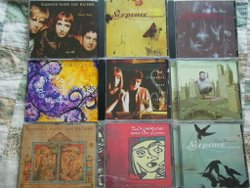A New Donut Company
I was introduced to a new donut company this morning: LeMar's. Well, it isn't a new donut company, but it seems to be relatively new to St. Louis and it only has one location, in Creve Coeur, at the moment.
I've now tried two of their huge, $.75 donuts, and I'm fairly happy with them. This morning, I had a lemon jelly donut. It was probably close to twice the size of an average jelly donut, was very soft and had a good icing on it. The lemon wasn't the tartest, but it was good. Just a little while ago, I tried another one, a German chocolate donut, that was excellent.
As a whole, LeMar's isn't as tasty as Krispy Kreme, I'd say, but I'll stop again. LeMar's claims the Rocky Mountain News chose their donuts over Krispy Kreme and Dunkin' Donuts (as well as others). While I'd probably agree that the donuts I enjoyed today where better than Dunkin' Donuts by quite a bit, I suspect it was a bit of hometown pride on the part of the News to pass up Krispy Kreme for first place. That's my professional donut eating story and I'm sticking to it.![]()
iThink therfore iCon
Taking on a different theme after my summer reading that has been mostly composed of light theology, “Christian life” and fictional books, I'm reading the new biography of Steve Jobs, iCon: The Greatest Second Act in the History of Business.
It is an interesting book so far that is very hard to put down. The book is detailed, insightful and well crafted in its storytelling. In a way, it reminds me of On the Firing Line: My 500 Days at Apple, Gil Amelio's book, which was co-authored by William Simon, the co-author of this book as well, in its insights into the operation of Apple. There is another similarity between the two books: they both paint Jobs as visionary but also as general nasty.
I think everyone knows Jobs is suppose to be fairly unpleasant to work with (and was more so in the past), but I cannot help but wonder if this book tries to tip the scales in that direction more than necessary to tell the story. It seems like many of Jobs' smart moves are attributed to luck, while even necessary actions that were unfortunate are made to sound mean spirited. If Jobs and a given person have different ways of retelling an incident, the book seems to always turn against Jobs.
For example, the book spends a good deal of time talking about how the original Macintosh failed to sell as many units as Jobs had predicted (one in a set of events that led to the show down between Jobs and Scully, which was the beginning of the dark ages at Apple that ended only when Jobs returned). On the other hand, while the book notes that the Mac was selling very well after Jobs resigned, it seems to act as if that was not Jobs doing. On the other hand, I think an unbiased observer would agree that Apple's good years in the late 80's were essentially coming from the company burning up the last bits of the vision it had been endowed with by Jobs. The book likewise does not seem to appreciate how good the design of NeXTSTEP was, and instead talks about how Jobs focused too much on how the machine looked. In fact, it compares the NeXTcube to a beautiful but mentally lacking “starlet.”
We'll see how it turns out. I am enjoying the book, but I simply think it is too harsh on Jobs. I'm only half way through it, so I'll have to blog later on about how the second half paints him.
Jesus Christ Superstar
As I noted last night, I just had the pleasure of seeing the Muny production of Jesus Christ Superstar. It would be stating the obvious to say this was a bit different from Grease. Unlike my commentary on that a few weeks ago, in which I had a hard time pointing out non-objectionable parts of it, there is very little to object to in Weber's “rock opera” and a lot to appreciate.
As is the case for anyone dealing with Christ's passion, especially someone attempting to tell the story in a non-traditional way, Weber took some risks. It doesn't therefore surprise me that the musical was controversial when it came out. Jesus' humanity is emphasized over His divinity, even He seem to almost doubt His nature, but as a whole, Judas seems to suggest Jesus takes an active role in letting people call Him God, which is a far more noticeable recognition of Jesus as a willing recipient of that title than the minor comments made by Jesus that may suggest the opposite. That is, Weber and Rice do not run with the idea that Jesus never claimed to be God, unlike — yes, Mark, I'm sure you're waiting for this — Dan Brown.
As a whole, the musical provided a powerful portrayal of the last week before the crucifixion in such a jarringly different way that it actually amplified some parts, rather than diminishing them. I appreciate the perspective of Judas, something that the Gospels do not provide for us, but have rather left us to imagine for ourselves. I generally believe that suggesting Judas did the deed exclusively for the 30 pieces of silver is an oversimplification. Perhaps he did think he was helping Jesus, or at least keeping Jesus from causing more “harm” to His followers, as the Judas in the play suggests. (I've often leaned more on the idea that perhaps, like Simon the Zealot, he might have been looking for a — well — zealous removal of the Romans and was trying to force it to happen.)
The lack of a resurrection scene was a bit disappointing.
What I'd really like to mention again, though, is the actors themselves. The actor playing Jesus put in a superb performance, particularly in the temple scene's piercing cry. Judas, in my opinion, stole the show with an absolutely stellar performance; the actor playing Judas had the voice to tackle some very difficult songs and he did so powerfully (I think notably better than the singer on the official Superstar soundtrack). His voice was powerful and clear, even when he was hunched over. The man playing Herod, who apparently is no stranger to the Muny, also put in a marvelous performance that showed he felt entirely at home on this stage, and the actress playing Mary Magdalene had an excellent voice with a slight hint of a country music singer in it.
My major complaint, if it can be considered one, is that the majority of the music in this play was not memorable on its own. As a whole, the play was excellent, but unlike some other musicals (perhaps, to an extent, even Grease), it lacked the stand alone songs that otherwise might stick in my head. Meredith Wilson's the Music Man, which I enjoyed at the Muny last year, left me with such notable tunes as Marian the Librarian, Lida Rose, Good Night, My Someone, You Got Trouble and, of course, Seventy-Six Trombones stuck in constant rotation in my head for sometime after seeing it and they remain in fairly frequent “shuffle” there (not to mention on my iPod; I own the original broadway soundtrack of it now).
With a musical, I suppose one can seek two different things: music or a story. Ideally, the play will provide both. Superstar does, but, ironically, I think the fact that all of the words are set to music does actually weaken its music outside of the story.
Still, I'd be tempted to go back to the Muny and sit in the free seats to hear it again, if it wasn't quite so long of drive to go there.
Too Much Heaven on Their Minds

Knew that I would make it if I tried.
Then when we retire, we can write the Gospels,
So they'll still talk about us when we've died.
—The Disciples
Tonight, I had the pleasure of seeing a production in the 87th season of the Muny, the United States' largest and oldest outdoor theater: Andrew Lloyd Weber's Jesus Christ Superstar. Wow. It was, well, spectacular. The actors playing Jesus and Judas were absolutely amazing (especially Judas). Mary Magadeline also gave a stellar perfomance. And then there was Herod…
I was a bit afraid the show wouldn't make it all the way through; it started raining about two-thirds of the way through the first act. Fortunately, the rain stopped shortly thereafter and the weather cooperated the rest of the time. I'll write some of my thoughts on the show itself tomorrow.
To Find a Gift Card
I was cleaning today when I stumbled across a Borders giftcard I had received at Christmas and never used. This presents me with a difficult situation: just what should I buy with it?![]() I could go over to a local Borders Books, Music and Cafe and perhaps pick up a book. Or, on Borders.com (which is run by Amazon.com), I could probably pick up a few. Either way, I could pick up a book I saw yesterday, entitled Eastern Orthodox Christianity: A Western Perspective, which looks very interesting. Or I could buy another book from Karl Barth, I was looking at his books when I ran into the other one. Or, I could perhaps buy part of C.S. Lewis' space trilogy, or the Rising (the first prequel in the Left Behind series)… oh the possibilities!
I could go over to a local Borders Books, Music and Cafe and perhaps pick up a book. Or, on Borders.com (which is run by Amazon.com), I could probably pick up a few. Either way, I could pick up a book I saw yesterday, entitled Eastern Orthodox Christianity: A Western Perspective, which looks very interesting. Or I could buy another book from Karl Barth, I was looking at his books when I ran into the other one. Or, I could perhaps buy part of C.S. Lewis' space trilogy, or the Rising (the first prequel in the Left Behind series)… oh the possibilities!
On the other hand, I could also buy a CD — I'm intrigued by Nichole Nordeman's new CD Brave (I purchased Woven & Spun after she opened Steven Curtis Chapman's show here a few years back). Or I could perhaps buy something else…
Yes, when I'm given a gift card for a book store, I'm like a kid in a candy store. Well, actually, I'm like that a lot of times when I'm in a book store. I was just at Borders this week and walked out with a stack of books from their bargain book section (including one of Emile Durkheim's books for five bucks!).
To Cast a Pod?
I'm pondering if I should dip my toes in the Podcasting waters. Tonight I worked up an entire 20 minute podcast and put it all together in GarageBand — including music — in about an hour. It was rather fun. But I'm not sure if I can commit to regularly taking out the time to do a podcast; unlike a text entry like this, podcasting requires a larger block of uninterrupted time (even if it might not require more time as a whole). When I'm writing a blog entry, I might be interrupted every few minutes, but if I'm recording myself, I cannot be interrupted as easily.
For that matter, I've listened to a few podcasts, and beyond the enjoyment I've gotten at putting voices to the words of the bloggers who are podcasting, I have not found myself becoming a regular listener. It is not a matter of whether the podcast was good, but I've found I simply do not have a lot of periods of time in which listening to a podcast is convenient (unlike text blogging).
Those two reasons make me think perhaps I won't publish my first (and perhaps only) stab at podcasting.
Photo Quest #3: Late Again
This is my June entry in Flip's Photo Quest (number 18). I don't have much of an excuse for being late, but I do have an excuse for being this late: my main computer, with all of my graphics software, is in the shop. I was going to wait to import the photos until I got it back, but I decided to try out Google's Picassa 2 on my Windows XP box and see how it worked. As it turned out, it worked quite nicely.

1. My best collections are Christmas related, but I decided I'd save that for some other photo, when I can show something that is actually well dusted and on display. I collect a lot of books, but who wants to see a messy, disorganized bookcase? With that in mind, the collection I present is my newly finish collection of Sixpence None the Richer albums.
Clockwise from top, left corner: Kiss Me (Original Single with “Sad But True”) [1997], Breathe Your Name (Single with “Northern Lights”) [2002], Don't Dream It's Over (Single with “Don't Pass Me By”) [2003], the Best of Sixpence None the Richer [2004], Divine Discontent [2002], this Beautiful Mess [1995], Sixpence None the Richer (newer version with “There She Goes”) [1997 [There She Goes - 1999]], Tickets for a Prayer Wheel (EP) [1996], the Fatherless and the Widow [1993] (in the center). That is everything that was released with the artists' apparent blessing; their former label has released several “best of” releases that simply take some tracks from Tickets to a Prayer Wheel, This Beautiful Mess and the Fatherless and the Widow, whereas the only “best of” mentioned above had unreleased tracks on it and came from the label the band ended its career with.

2. A flag, well, two, actually. I thought about hunting down a Missouri State Flag to go along with this, but you can just see that here.

3. This Norfolk pine (araucaria excelsa) is something I've grown; I have a larger one as well.

4. My shoe shelf, is really just my shoes stuck under my dresser. Does that count, Flip?

5. Here's what was once a tree stump. I actually saw this guy carved by someone who was very, very good with a chainsaw. There was a whole group of chainsaw artists that setup shop in Branson years ago, and this one came home. I cannot remember the price, but for all of the work, it was really reasonable. He hasn't been refinished for six years, so this year he is waiting for a new coat of spar varnish.
It's a Beautiful Day
A Good One. You ever have one of those days that starts out sort of okay, starts to go down hill and then all of a sudden does a 180 and becomes a great day? That's the kind of day I had today.![]()
PhotoQuest? Yes, I am incorrigible, as Kevin told me. Flip doesn't have hers up either, so maybe I have somewhat of an excuse though! I do have the pictures taken, I just need to hook up my memory card reader to my PowerBook to download and resize 'em (right now, I'm at my desk using — gasp! — Windows XP instead… more on that in another post).
I've Got Mail. Being ever the glutton for signing up for free e-mail accounts, I signed up for one of the new AIM Mail accounts to give it a spin a few weeks ago. As part of the launch, you get a message, after signing in for the first time, offering a daily contest you can enter in (enter once and you get the chance to win every day without any more intervention); apparently you can win a Mini Cooper S, a PlayStation Portable, iTunes Music Store music and various other things. I forgot all about it until the other day, when I decided to log-in and take a look see. As it turned out, I haven't won a Mini Cooper yet, but I did get a coupon for a free song on iTMS. Not too bad…
Oh, and for those who are counting, this takes me up to 5 free e-mail accounts (Yahoo! Mail, Netscape Mail, Gmail, AIM Mail and iBiblio are the ones I remember and are still active, at one time, I had a bunch of other ones). I don't have a Hotmail account, interestingly enough; I signed up for a Microsoft Passport when they still offered Hotmail-less Passport.com passports.
Of those, if I was going to use one, I'd use the Gmail account. Google has really done a nice job with the interface — it is lightweight and functional. I also managed to nab the coveted “my first intial plus last name” address, since I was invited to try Gmail fairly early in the beta. I have a .Mac account, however, whose e-mail is the one I generally use if I need an address other than the ones on my server.
London Bombings
I just do not know what to say, other than that this was sickening. My thoughts and prayers are with the families and friends of those who perished in the attacks in London today. May whoever perpetrated these crimes be brought to justice swiftly. Somehow, we must bring terrorism under control, but I'm not sure how that might be accomplished.
I wonder… if it was al-Qaeda, why didn't we pickup any chatter prior to the attack? Of course, even the best of intelligence can only catch so much, but it has seemed quiet to me in the news lately. I just hope any additional attacks will be stopped before they occur.
The Migration
Well, last night I was still busy copying stuff, so I didn't report exactly what I was up to. I copied any files of any importance onto the new hard disk I bought for my G5, then removed that drive so that Apple would be working with the warranted drive, and I would also have a backup of everything.
I also copied all files I expected I might want access to in the next week or two (most of my home directory) to my iPod. I then copied the 16.5 GB I placed on it onto my PowerBook, which is now serving as my primary system. (Thanks to .Mac sync, my PowerBook is usually already well sync'ed with the PowerMac, but I don't keep everything on it.) The only things I needed to copy onto it were my documents, photos and music. E-mail, being IMAP-based, was already there, and .Mac takes care of bookmarks, contacts and calendar.
I then brought the PB onto my desk and plugged it into my Cinema Display. The system happily woke up from sleep and automatically switched to the maximum 1920×1200 resolution of the display. I could almost forget I wasn't on my G5, if it was not for the fact that things are quieter, and my dock looks itty bitty on this screen (since its size is adjusted for the normal 1024×768 resolution of the 12” PowerBook).
The Apple Store said they weren't sure what was causing the problem: the SATA controller, one of the processors, the logic board as a whole, etc., but they were going to look at it today. Depending on what is needed, they may already have the needed parts in stock. That would be nice!






